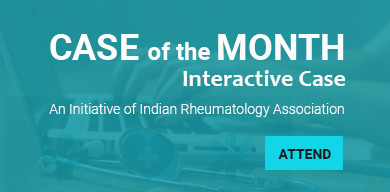Indian Rheumatology Association Recommendations
Indian Rheumatology Association’s Recommendations on the use of antimalarials chloroquine and hydroxychloroquine for the COVID 19 pandemic
The ongoing global pandemic of COVID-19 has caused a serious threat to the health and economy. The pandemic has now struck India and cases are on the rise. Owing to the prevailing debates over the use of antimalarials especially Hydroxychloroquine ( HCQ) for preventing and treating these cases (due to wide availability and access to both published and unpublished data on the web and social networking sites). But the fact that these drugs are essential for patients with autoimmune diseases like Rheumatoid arthritis and lupus which are dealt with by the Rheumatologists and there are limited stocks in the market as of now, we have reviewed the available literature ourselves and come out with the following suggestions :
1. Based on their mechanism of actions, both chloroquine (CQ) and hydroxychloroquine (HCQ) seem to have antiviral potency, also the SARS-CoV-2 virus. However, we prefer the use of HCQ due its greater in vitro potency in some studies, lesser adverse effects and relatively easy availability.
For Prevention : The focus of most of the international organizations has now shifted on preventing the transmission of novel coronavirus 2019 (SARS-CoV-2). This is originating from in-vitro studies of chloroquine (CQ) and hydroxychloroquine (HCQ) showing efficacy in preventing viral replication and previous in-vitro studies demonstratinganti-viral efficacy of CQ in influenza, Ebola, and Nipah viruses. The National Taskforce for COVID 19, constituted by the Indian Council of Medical Research (ICMR), recommends the use of hydroxychloroquine for prophylaxis for “high-risk population” (healthcare worker taking care of suspected or confirmed case of COVID-19 and household contacts of laboratory-confirmed cases). ICMR clearly warns against the sense of false protection with this prophylaxis(1). But lack of clinical studies and failed pre-clinical and clinical studies in other viruses necessitates exercising caution. Hence, we systematically reviewed the existing literature until 25th March 2020 to evaluate the prophylactic role of CQ or HCQ on novel coronavirus 2019(Article is currently under review). Threein vitro studies(2–4) have shown promising efficacy of CQ and HCQ against novel coronavirus 2019 and two expert clinical opinions(5,6) have advocated the possibility of prophylactic use of these drugs against COVID-19. There are three studies currently assessing the prophylactic role of CQ or HCQ on COVID-19, but there are no published data yet(7). However, the lack of robust clinical evidence till date, questionable in-vivo translational of in-vitro studies, safety concerns, drug interactions, the danger of deprivation of these essential drugs to legitimate patients due to panic stocking and instilling a false sense of protection among the common mass are important scientific and logistic concerns. According to us, the prophylactic role of CQ or HCQ against COVID-19 needs to be further reviewed before recommending as prophylactic agents on a large scale. If used at all, the subjects should preferably be included as a part of clinical trial some of which are already ongoing in the USA and elsewhere.
2. For treatment of positive cases, hydroxychloroquine may be started at doses of 800mg on day 1 and 400mg (not more than 5mg/kg/d) from day 2 for another 5 days. Regimen should be started from Day 1 of positively proven or day 1 of quarantine if testing not done.
3. For hospitalised patients, HCQ may be started in the same doses as above to prevent further progression of disease.
4. Where HCQ is unavailable, CQ phosphate may be used in doses of 500mg twice a day for 7 days.
Note : Complications of HCQ and or CQ ( QT prolongation, myopathy etc) have to be considered especially in the older population.
The recommendations above are based on observational studies, reviews, guidelines by other associations like the CDC/WHO. No randomised controlled trials are yet available as a form of robust evidence.
References
1. HCQ_Recommendation_22March_final_MM_V2.pdf [Internet]. [cited 2020 Mar 27]. Available from: https://icmr.nic.in/sites/default/files/upload_documents/HCQ_Recommendation_22March_final_MM_V2.pdf
2. Liu J, Cao R, Xu M, Wang X, Zhang H, Hu H, et al. Hydroxychloroquine, a less toxic derivative of chloroquine, is effective in inhibiting SARS-CoV-2 infection in vitro. Cell Discov. 2020 Mar 18;6(1):1–4.
3. Wang M, Cao R, Zhang L, Yang X, Liu J, Xu M, et al. Remdesivir and chloroquine effectively inhibit the recently emerged novel coronavirus (2019-nCoV) in vitro. Cell Res [Internet]. 2020; Available from: https://doi.org/10.1038/s41422-020-0282-0
4. Yao X, Ye F, Zhang M, Cui C, Huang B, Niu P, et al. In Vitro Antiviral Activity and Projection of Optimized Dosing Design of Hydroxychloroquine for the Treatment of Severe Acute Respiratory Syndrome Coronavirus 2 (SARS-CoV-2). Clin Infect Dis. 2020;ciaa237.
5. Colson P, Rolain J-M, Raoult D. Chloroquine for the 2019 novel coronavirus. Int J Antimicrob Agents. 2020;105923.
6. Zhou D, Dai S-M, Tong Q. COVID-19: a recommendation to examine the effect of hydroxychloroquine in preventing infection and progression. J Antimicrob Chemother [Internet]. [cited 2020 Mar 27]; Available from: https://academic.oup.com/jac/advance-article/doi/10.1093/jac/dkaa114/5810487
7. Search of: hydroxychloroquine | covid - List Results - ClinicalTrials.gov [Internet]. [cited 2020 Mar 27]. Available from: https://clinicaltrials.gov/ct2/results?term=hydroxychloroquine&cond=covid&Search=Apply&age_v=&gndr=&type=&rslt=








